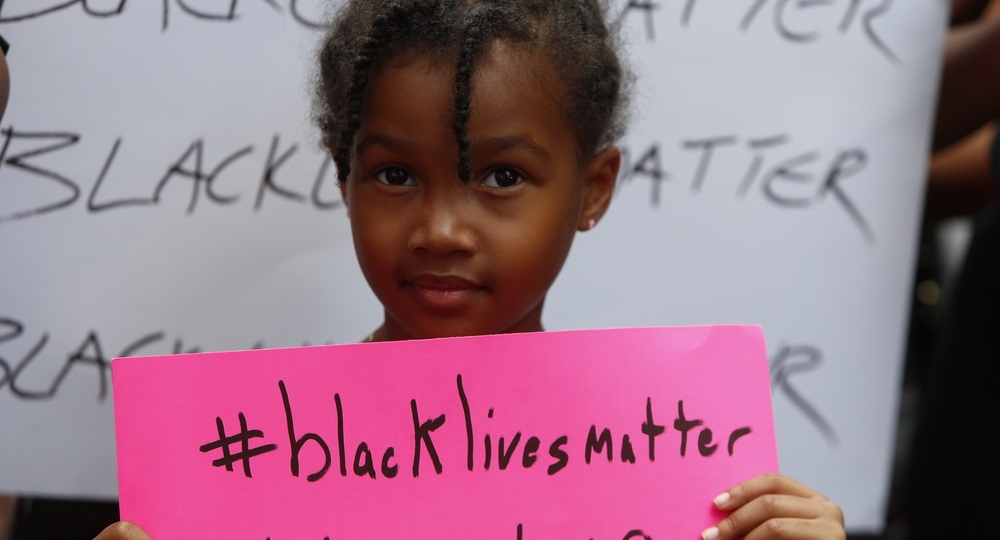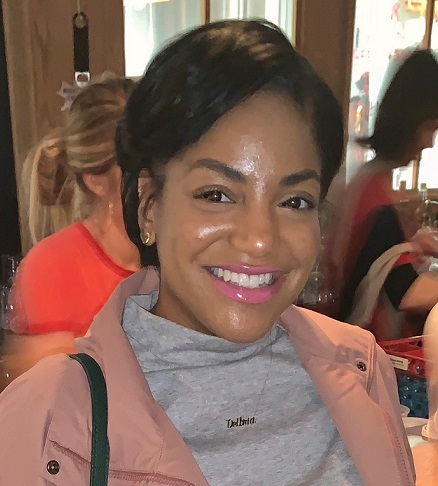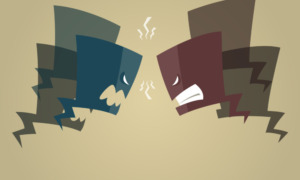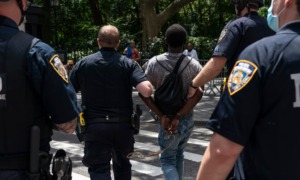 A KATZ/SHUTTERSTOCK
A KATZ/SHUTTERSTOCK
We met at Freedom Plaza. This was my first protest since the killings of George Floyd and Breonna Taylor. People of all ages, abilities, genders, races and ethnicities were there to stand up for justice.
With an impassioned call to action from one of the organizers, the crowd headed toward Capitol Hill chanting, “No Justice, No Peace.” I fell in line toward the back, taking in the moment and the movement.
As we walked, I noticed a dad and his son, no more than 3 or 4, walking with us. They were white. As the protest went on, the dad explained each chant to his son, encouraging him with the rhythm of the crowd. “Breonna Taylor.” “George Floyd.” “Hands Up, Don’t Shoot.” I remember thinking, if every non-Black person did this with their children, then maybe, just maybe, my children will not have to march in their lifetime.
I lost sight of the boy and his father, but not of the feeling they gave me. Hope.
A few days later, social media was flooded with a video of 7-year-old Wynta-Amor Rogers invoking our ancestors with her rallying cry, “No Justice, No Peace.” But this time, I didn’t feel hope.
There is no doubt in my mind that by the time she graduates high school, Wynta-Amor will have experienced firsthand all that it means to be Black in a virulently anti-Black society, an experience uniquely different from her white peers. I cannot say the same for the little white boy at Freedom Plaza. He will not be given “the talk.” No, not the one about the birds and the bees, but the one that I got from my parents, and they got from their parents.
Oppression has robbed Black youth of their childhood for centuries. Beverly Daniel Tatum, the author of “Why Are All the Black Kids Sitting Together in the Cafeteria?” remembers the conversation she had with her son at age 3 when a peer attributed his dark skin to drinking too much chocolate milk. Tatum’s explanation and the conversations she had with him throughout his life leads to a bigger question: Why do Black children have to learn about racism before they learn cursive?
In “We Want to Do More than Survive,” Bettina Love talks about “spirit murdering” of Black youth — a constant attack on a Black child’s soul — a loss of protection, safety, nurturance and acceptance due to racism. These attacks, Love says, lead to a life of exhaustion and doubt in which your only coping skill is to survive until the next day. But don’t our Black youth deserve more than just a life of survival, even if only for a little bit?
Adultification
Rogers became an overnight sensation. The media hailed her as the “the voice of the movement,” forgetting that as a 7-year-old it is not her responsibility to be the voice of a movement to end state-sanctioned violence against Black bodies. Especially not a Black child.

Delbria Walton
This conversation is not new — the adultification of Black children, especially Black girls, has been around since the start of chattel slavery. Yes, slavery. It always goes back to slavery. Anyway, Monique W. Morris, author of “Pushout: The Criminalization of Black Girls in School,” argues that Black girls never really get to be “girls.” From an early age they are seen as Black women, and as Black women they are branded with all the good and bad that comes with that: loud, bossy, overtly sexual, “grown,” aggressive, etc. The adjectives used to describe Wynta-Amor include brave, fierce, strong. But why should a 7-year-old NEED to be strong?
I think this is the time for the “strong black woman” trope to enter into the conversation. Spoiler alert: This goes back to slavery as well. In “How the Expectation of Strength Harms Black Girls and Women,” Seanna Leath writes how her research finds that among Black women and girls, they see their strength as a “birthright.”
Many Black women look to their strength as a way to survive, a coping mechanism for the legacy of slavery, colonization, disenfranchisement and rape of the Black woman in this country. A history that Black youth should not have to bear, not yet — not ever. This “burden of strength,” Leath says, on Black girls and women can lead to social, emotional, mental and physical health issues.
Let me be clear, this is by no means a criticism of the adults in Wynta-Amor’s life who made the choice to bring her to the protest. Black Americans have struggled and fought for freedom and the recognition of their humanity for so many generations that resistance has become something akin to a generational culture. “We must show the kids of the world the right way and I will start with mine,” said Lakyia Jackson, Wynta-Amor’s mom via her social media.
Black youth deserve more than just a life of survival, but if America cannot guarantee that, could there at least be a little bit of a reprieve from the reality when they are children?
As I reflect on that day at Freedom Plaza with the little boy and his father, I realize now the hope I felt wasn’t for them, myself, or even this country … it was for Wynta-Amor and all Black youth. Hope that they can live a life not characterized by resistance, but of opportunity.
I am committed to defending Black life. I am committed to justice for Black lives. I am committed to doing this without sacrificing the spirit and the joy that still lives in our Black youth. Our joy, our spirit is our greatest revolution.
Delbria Walton, MSW, is senior policy associate at The Forum for Youth Investment. Her ideal day includes almond M&Ms, a good romantic comedy and a summer night’s rain where all you need is a light jacket.































